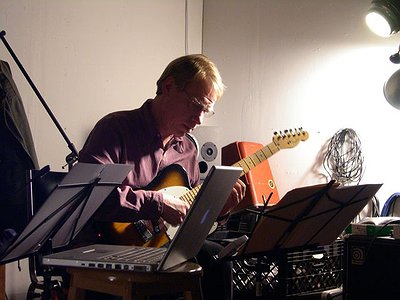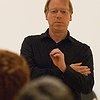The relationship between music and other forms of art – painting, video art and cinema most importantly - has become increasingly important. How do you see this relationship yourself and in how far, do you feel, does music relate to other senses than hearing alone?
I really don’t think this relationship between music and other art forms is any more important now than it ever was. And I don’t find the relationships between the media interesting at all in the abstract. It is only the specifics that fascinate me. I’m much more interested in hearing Keith Rowe talk about how he uses Twombly or Rothko than I am in any general description of the relation between painting and music.
Music is more than just hearing anyway. We see or decide to close our eyes; we think; we use words. I have no theory about any of that but do try to remain conscious of all the ways music can affect people.
How would you define the term “interpretation”? How important is it for you to closely work together with the artists performing your work?
Interpretation means: making use of the music for your own purposes, even if those purposes might include things introduced by the piece itself. I love working with musicians playing my pieces, but more and more it happens without my being there, and that’s also quite interesting. I like the surprises that come about that way as much as I like helping to shape a performance.
The effect of a piece doesn't merely depend on the performance of the musicians, but also on the place it is performed at. How do you see the relationship between location and sound? In how far do you feel the current system of concert halls is still the right one for your music – or for contemporary music in general?
I have to say I’m just as interested in the idea of non-place as I am in a specific one. In my field recording work I distinguish between locations which is a highly specific thing, think of the coordinate system as a model. On the other end of the spectrum is place, which combines various times and perspectives, some of which are virtual, into an incrustation of impressions. Los Angeles is a place. I’d have to say that right now I’m interested in the intersection of these almost contradictory tendencies: my work Transparent City was very much about this, and I have continued to explore this direction both on record and in live performance.
The role of the composer has always been subject to change. What's your view on the (e.g. political/social/creative) tasks of composers today and how do you try to meet these goals in your work?
I don’t think about the role at all. I try to keep my tasks reasonable. And I try to help people who I think are doing interesting work in whatever small way I can.
How, do you feel, could contemporary compositions reach the attention of a wider audience?
I have no idea how, but I think it is happening–gradually and in ways probably none of us can really fathom or understand. It’s fragile enough though that I wouldn’t want to say anything about why or how it might be happening. It’s just amazing to me that there is an actual, passionate and critical audience for experimental music. I do not take that for granted.
Usually, it is considered that it is the job of the composer to win over an audience. But listening is also an active, rather than just a passive process. How do you see the role of the listener in the musical communication process?
I think the musician or composer’s job is to make music. If winning over an audience is anyone’s job, it would be the promoter or publicist’s. For me it is important to keep this straight. I am very interested in listening, but you can’t get people to listen, really. They have to decide to do it. Once a person decides to listen anything can happen.
Music-sharing sites and -blogs as well as a flood of releases in general are presenting both listeners and artists with challenging questions. What's your view on the value of music today? In what way does the abundance of music change our perception of it?
Statistically speaking there’s always been more to hear than we can actually accommodate, just ask any bird-watcher. It’s just that now we are conscious of this fact in a slightly different way. I love recordings and love making them, but perhaps the abundance of them and the monotony of internet music delivery creates a parallel desire to go somewhere to hear music played or to just go somewhere and listen. I certainly hope that’s the case.
Composers have traditionally found it hard to secure a living with their art. What are the financial realities you're living with and in which way, do you feel, could they be improved?
Quite early on I was aware that the things that I wanted to make might not be so easy to sell. I can live with that – but it did mean I had to figure out how to make a living in some other way. I feel lucky that, by chance, I discovered that I enjoy teaching and that people wanted to pay me to do it.
Given the number of people struggling to make ends meet or even feed themselves in this world, it would be ridiculous for me to complain about my lot.
Please recommend two artists to our readers which you feel deserve their attention.
Oswald Egger (poet)
Marcus Kaiser (composer, cellist, artist, architect, and other things)
Read Michael Pisaro's blog here, michaelpisaro.blogspot.co.uk and read more about Wandelweiser at www.wandelweiser.de



